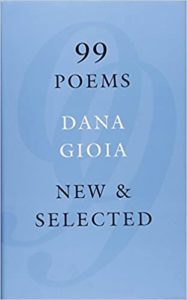Does poetry matter less than it once did? Poet and author Dana Gioia says America is living a cultural paradox: “There has never been a country in the history of the world that has paid more people to profess poetry.” Yet, it seems we’ve missed the mark.
In this episode, EconTalk host Russ Roberts welcomes Gioia to talk about poetry, his new book, his professional trajectory (which includes an abandoning a graduate writing program for an MBA), and what matters in life and literature.
Perhaps as evidence of Gioia’s point, many listeners reacted unfavorably to this episode- I think without having listened. Why an EconTalk about poetry, they asked? What good is that? Give it a listen. Trust me, I’m one of you- someone who thinks they just don’t “get” poetry. This episode will change your mind. Gioia describes beautifully what good poetry is and isn’t. The purpose of poetry is not necessarily to understand it, but to experience it, says Gioia. And you don’t want to miss Gioia recite some of his own poems. It works, and I am now the proud owner of- I admit- my first book of poetry, Gioia’s 99 Poems. It’s lovely.

1- Gioia reminds us that poetry was once very much a part of mainstream American culture. What made America lose its mass audience for poetry?
2- Gioia says, “People who are successful in life, they know it’s their own talents and everything else, but they also know that there were people who awakened those talents, refined them, gave them the little push, gave them the advice.” Who was the teacher who most impacted YOU, and how?
3- Why do Roberts and Gioia think you should read books like the Iliad and the Odyssey? What is the difference for Gioia between “disposable books” and literature- like “getting in your kishkes? To what extent do you agree with Gioia that prior to the pandemic, there were too many books, movies, concerts, etc.?
4- Gioia notes that poetry is the fastest growing art in the US among people aged 18-25. Poetry, he says, is “performative, democratic, accessible.” What does that mean? How does Amanda Gorman fit into this story?
5- How might a poem be considered a kind of emergent order? How does the language of poetry and economics compare?


READER COMMENTS
John Alcorn
Mar 20 2021 at 6:33pm
Thank you for bringing back the follow-up questions!
1. The gramophone and the emergence of the market for popular music with lyrics. Music + lyrics = the new poetry of the people.
2. A fun question!
Jon Elster (the great Norwegian social scientist). His writings awakened me to methodological individualism (a framework of interdisciplinary social science) and ethical individualism — and also intellectual honesty and the importance of being ‘clear enough to be wrong.’
My best ‘teachers’ have been authors, not classroom teachers. When a book blows my mind, I then devour everything else written by the same author. Erwin Panofsky, Sebastiano Timpanaro, Thomas C. Schelling, C. Behan McCullagh, Thomas Sowell, David Friedman, Kazuo Ishiguro, and more.
Another great teacher: An idiosyncratic selection of ‘the great books’: Thucydides (still underrated), Dante, Montaigne, La Rochefoucauld, David Hume, Adam Smith, William Blake, Giacomo Leopardi, Alessandro Manzoni, Tolstoy, J.S. Mill, Freud.
Colleagues, too, can be best teachers: I badgered half a dozen profs at Trinity College, mostly economists, to form a reading group, ‘The Individual & Society.’ We met weekly for a decade. There I learned to think like an economist (or so I hope).
Because I had been trained in the humanities, it took a village to teach me economic reasoning!
3. Great literature at once stimulates the mind, and touches — and sometimes moves — the heart.
4. I’m not persuaded, unless we’re talking about popular songs (music + lyrics) rather than conventional poetry books.
5. Poetry usually involves conventions — rhyme, meter, and structure — as constraints or as implicit foils. The conventions emerge by individual example and imitation. Conventions enable creativity — Conventions enable artists to balance imagination (the unconscious) and rationality (choice within constraints). Moreover, conventional forms (e.g., the sonnet) provide a focal point for peer appraisal — Peer judgment is often a standard of excellence among artists (poets).
I suppose that conventions emerge among economists, about proper economic models.
Economists often inadvertently sow confusion by using everyday vocabulary with specialized, technical meanings. Examples are ‘rational,’ ‘utility,’ ‘efficiency.’
Amy Willis
Mar 21 2021 at 11:22am
Ah, John, thanks! I always look forward to your thoughtful replies. Love keeping the conversation going. And don’t worry- many more follow ups to come!
Regarding your #5 reply and peer judgment… I had started a question about criticism, which Gioia and Russ spent a good bit of time on. So how does criticism relate to peer judgment? It’s tempting to say its merely formalized peer judgment, but I’m also reminded of Gioia’s lovely description in that it comes from the most human place… conversation and reflection. What do you think the difference is?
Brandon
Mar 20 2021 at 8:02pm
I didn’t listen, but hopefully they gave Bellow’s Humboldt’s Gift a shout out (it’s all about the paradox you mention, Amy).
Amy Willis
Mar 21 2021 at 11:18am
Brandon, they did not… but I just bought my SECOND volume. Thanks for the tip, and I look forward to reading.
John Alcorn
Mar 21 2021 at 9:50pm
@Amy,
If memory serves me well, Dana Gioia explained that academic criticism turns students off to poetry. Sad, but often true. IMO much academic criticism is wrongheaded, or at least very incomplete, insofar as it reduces literature and art to sociology. See Roger Kimball’s sardonic lampoon of academic art criticism, The Rape of the Masters.
Instead of debunking great poets, professors should help students (a) to understand and appreciate the cognitive value of great literature, and (b) to experience aesthetic emotions. The hope is that a student will find beauty (or awe) in a poem’s insights, artfully expressed. Cognition and aesthetic sentiments are intertwined.
Now, a good poet doesn’t care about academic criticism. She cares what other good poets think of her poetry. People who know poetry from the inside, through the crucible of creativity. Peer judgment. So it is with artists. And the same is true of scientists. By contrast, the internalized standard of judgment among businesspersons is — the market.
Comments are closed.